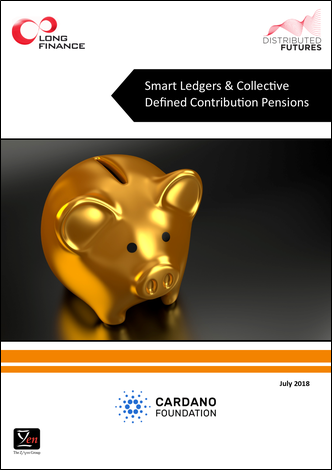Authors
Iain Clacher, Con Keating, and David McKee
Published by
Long Finance (July 2018), 47 pages.
Share on social media:

Smart Ledgers & Collective: Defined Contribution Pensions
Long Finance's Distributed Futures research programme is pleased to announce the publication of the report, “Smart Ledgers & Collective Defined Contribution Pensions”
Veterans of the UK pensions scene often describe a former world in which pensions were organised on a best efforts basis. They tend to lament its passing and view the current situation, in which pensions promises are either hard and immutable, as is the case with UK defined benefit (DB) schemes, or non-existent, as is the case with defined contribution (DC) schemes, unfavourably. However, in recent years, there has been an aspiration to allow greater flexibility and innovation in pension provision, than is allowed by these two extremes.
The report focuses on collective defined contribution (CDC) pensions, a new integrated system of accumulation and decumulation, which brings with it some new technological challenges. There is a need for an integrated administration and management system. Some aspects of a CDC scheme are rooted in practices arising in the DB world and some in DC, but there are also some which are entirely new, such as risk-sharing among members.
The use of smart ledger technology is a natural solution to many of the challenges a CDC structure poses for pensions governance and administration. First, smart ledgers, ensure the accuracy and immutability of previous records including the assumptions and decisions of trustees. Consequently, there is transparency as to the decision process, which is not something that currently exists in pensions. Second, the multi-period accruals of assets, contributions, and the entitlements of scheme members, as well as the payment of pensions are all linked in chains over time. This technology therefore affords transparency for members; they may view both the capital value and the pension income equivalent of this in near real-time, as well as its historic evolution.
As Michael Parsons, Chairman of Cardano Foundation, wrote in his Foreword “There couldn’t be a more pertinent publication for Distributed Futures than one on pensions. Why? Because pensions require long-term, complex administration against a set of rules with good governance. Think immutable ledgers, smart code, and well-thought-out long-term governance, i.e. smart ledgers.“




